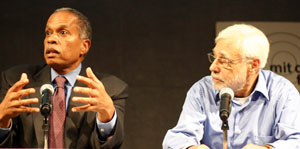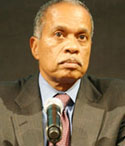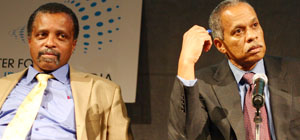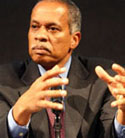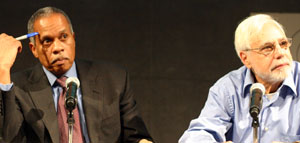| Race, Politics and American Media |
||||
|
Thursday, October 8, 2009
5-7 p.m. Bartos Theater 20 Ames Street, MIT Cambridge, MA Abstract The election of an African-American president in Nov. 2008 has been hailed as a transforming event. But has Obama's ascension transformed anything? Many people’s answer to that question changed this summer when a famous Harvard professor was arrested at his home in Cambridge. Are the harsh realities of race and class in the U.S. clearer now or murkier, following the media tsunami of Gatesgate? And has this polarizing event given greater visibility to racial minorities in the media's coverage of politics? How are race issues and racial politics covered in our national media, and what are the implications of the demise of major city newspapers for the coverage of race and politics? Juan Williams of NPR and Fox News will discuss these and related questions in a candid conversation with Phillip Thompson, associate professor of urban politics in the Department of Urban Studies and Planning, and David Thorburn, professor of literature and director of the Communications Forum at MIT. This forum is the first of two this term in our ongoing civic media series, a collaboration of the Communications Forum and the Media Lab’s Center for Future Civic Media. An audio recording of Race, Politics and American Media is now available. A downloadable podcast of Race, Politics and American Media is now available. Video of Race, Politics and American Media is now available. [this is an edited summary, not a verbatim transcript] David Thorburn began by asking Juan Williams to discuss his own career in the context of the emergence of a new generation of minority journalists.
Williams said that during his childhood in Brooklyn, his mother, who worked in Manhattan, used to bring him a variety of newspapers from New York and New Jersey that had been left on the subway. This was in the 1960s when the great city was home to more than a dozen morning and afternoon newspapers. One of his deep pleasures as a child was to read the various baseball writers, who inspired his ambition to be a journalist. But he was struck by the absence of people of color in the world of newspapers. His fantasy became to break through this color barrier. Although he wrote for his high school newspaper, he did not work at his college paper during his first year. Between his freshman and sophomore years he applied to the Philadelphia Evening Bulletin as an intern. He was the youngest staffer and the only person of color. His bosses were skeptical about him at first; he was told “this is not a babysitting operation,” by the managing editor. But he succeeded at the Bulletin, where he became a paid reporter. In his next job, at the Providence Journal, he was once again the only minority reporter. He found that many citizens had no concept of how to deal with a black journalist. This created an interesting tension. There was a shifting of relationship between the people he was interviewing and reporting on and the person with the pen. His next move was to The Washington Post. After 1968, there had been a wave of black journalists coming into news organizations across the country. Many of these reporters were not given bylines. Most were simply used to collect information which was provided to the white journalists to write their stories. Williams – who graduated in 1976 – was part of the second wave of minority journalists who were better prepared and able to compete with their white colleagues. Thorburn next asked about the election of Barack Obama. Was it truly a watershed moment in American race relations? Had the media coverage of minority issues changed following the election?
Williams noted an increase in the number of commentators of color. Correspondents from minority outlets such as Essence are now included in White House briefings. But although it’s true that the number of minority commentators and reporters has increased, TV anchors remain mainly male and nearly always white. Williams pointed out that he is the only black person who appears every week on the Sunday morning news programs. In general, he explained, these programs are conversations among older white males. While there has been a shift to white women in the anchor seat there are no people of color presenting the national news. But the problem is not limited to the white-dominated majority media. He described a “chilling response” from an executive of a black cable channel to the question of whether his audience would accept a black news anchor. The response – even from someone working within the minority media – was that black men want sports or porn. This reinforces the belief that minority audience won't respond to serious political discourse. The failure to invest in news products by media organizations like BET is, in Williams mind, an embarrassment. This thinking is typical of all most major American media institutions: they pander to minority audiences instead of genuinely serving them. They target the lowest instincts of the minority communities – sports, sex and comedy. The result is that there is virtually no news aimed for those communities. Thorburn next turned to the overall decline of newspapers and how this has affected minority news outlets. Williams explained that he works for mainstream white news organizations and as a result doesn't have much experience with minority outlets. As an observer, though, he believes that many minority newspapers are on the edge of going out of business if they haven't already. In the past these newspapers were the bible of their communities. As they disappear nothing comparable is taking their place. The communities have also not been well served by the mainstream media in the past. There was an attempt to to preserve these newspapers by bringing some of them together to share resources; but overall, especially in the big cities, these outlets became an afterthought – even among the growing black middle class. This has not been the case for magazines and radio targeting minority communities. Talk radio in particular has thrived with many black hosts. It’s significant, Williams suggested, that there is such a huge gulf politically and ideologically between black and white talk show hosts. This realm of communication remains incredibly segregated. At this point, Phil Thompson joined the conversation. He generally agreed with Williams' observations – pointing out also that the Philadelphia Enquirer had plenty of coverage of the minority community while he was growing up there. He went on to describe the important role of black journals as an outlet for African American intellectuals. Publications like the African World provided opportunities for dialog between black students and scholars that are no longer easily found. The decline of this dialog predates the Internet and the decline of the newspaper industry as a whole.
He recounted stories from his grandparents about the The Chicago Defender: how railroad porters would throw bundles of the then-illegal paper out into fields in the South where it could be read and distributed. The newspapers were the main source for information that could help the community advance. It may be, he considered, that at this point the black middle class doesn't need or want information on how to advance. This prompted Williams to make an observation about the Washington Post. It is based in a predominantly black city but targets the white suburbs. But it does covers local news for Washington – such as the relationship between the city and Congress. The result is coverage of black communities as part of coverage outside of the specialty publications of the past. Thompson – who was involved with New York politics for more than a decade – made an interesting point about the difference in coverage between mainstream media and what matters to the minority community. In the mainstream media you will see coverage of Congressman Charles Rangel that focuses on scandal and controversy. In Harlem, the conversation around the Congressman is more about what he's failed to deliver; but that isn't being covered by the mainstream. The mainstream media may carry tales of murder and crime in the minority community but you rarely find the conversations that truly matter. Thorburn asked if these conversations might reemerge in cyberspace. Thompson said there are plenty of opportunities for these conversations to reemerge but that they haven't yet. He related a story from his time running the New York Housing Authority. IBM was in the process of installing optical fiber in public housing in New York. The company was curious why the community wasn't asking the information carriers to bid for the business – which could have brought in tens of millions of dollars that might be used to create communications channels for the community. The explanation was that there was no active community movement, no education, no structure or pathway for people to get excited or engaged. In short there was no place for this conversation to occur. Thorburn suggested that one conclusion might be that while there has been change, we have to wonder if these changes have made any impact on the community at large. Thompson recalled teaching at Columbia University on the edge of New York’s Harlem. Never think, he used to tell his students, that you can do off campus what you can do on campus. His students needed to understand the idea of being in a protected space. Yes, there are blacks at MIT and Columbia who are in positions of power – but if you walk one block off, you're in a different world. Thorburn wondered whether this reality was being covered adequately by the mainstream press. Williams pointed out that all the major publications are struggling to hold their audience. Audiences are fragmenting. This leads to niche- or narrow-casting. You see MSNBC going left, Fox going right and CNN struggling to carve out an identity. These channels target their audiences very well, but they stand in the way of creating a common story.
Even in publications aim to reach the black middle class – such as Ebony or Jet – you don't see an attempt to deal with issues that actually matter to the community. To his mind, these are essentially vanity publications. They don't cover the tawdry stories of minority America but tend to focus on how people are “living large.” “Do we see critical coverage of important minority issues in white papers?” Williams asked, “We don't even see it in the black papers!” Williams suggested that black intellectuals are creating spaces on the Internet – places where young, educated blacks are having conversations that matter. But low-income people – of any color – are not using the Internet to learn or organize. Thompson illustrated the failure of minority outlets to present critical coverage. When The Source, a magazine targeting the hip-hop community, began writing critically about the music and industry that supports it, the publisher began receiving death threats. The result was that the magazine stopped raising issues that would raise eyebrows in the community. Williams described his own experience in this vein. When he writes critically about issues in the minority community – rather than being thanked for paying attention – he is attacked for exposing the community's issues to the white world. The community often does not want to hear about failures or challenges. This isn't about the white papers, this is about the sensibilities of the black middle class. Q&A Thorburn opened the question period by asking Williams if he felt any tension or contradiction in his roles at National Public radio (NPR) and at Fox News. WILLIAMS: Certainly, one is radio and one is TV. Also, Fox competes as a conservative outlet. NPR is seen as a liberal outlet. NPR tries to be neutral but Fox has no such aspirations. On cable news the idea is to be as provocative as possible. NPR is boring by comparison. There are differences in how stories are told, how much time is devoted to a story. Many people don't know who the hosts are on NPR while people are very aware of them on Fox. On NPR you have one-on-one conversations with someone trying to tease a story out of you based on your depth of understanding and sources. On Fox it's more of a fight, with me as a foil. These are some huge differences. QUESTION: NPR seems to be doing a good job of weathering the storm that most media are facing. WILLIAMS: Generally the audience is growing or has been maintained, although there has been a slight decline over the past two quarters. This is an oasis in radio land. There isn't much like NPR on the dial. Economically things are tougher – 8% staff layoffs, decreases in funding. But I’m glad that you the listener hasn’t noticed. QUESTION: How is what counts as news determined? For example, American coverage of Japan tends to focus on fads and fashion, rarely on geopolitical or economic questions. WILLIAMS: If we look at coverage of Africa, you do see it being fit into stereotyped stories – war, famine, corruption etc. What you're doing as an editor is creating a publication for a specific audience. Japan as kooky is interesting to people. The deep details of Japanese politics are not going to be interesting to most readers. If you talk to American readers, they say they want local news. We can't get young women to read the newspapers period. Young men are drawn in by sports, but do they make the transition to the front page? They want local – maybe state – news – that's what leads to the sale of papers. When I ask people where they get news, I’m told John Stewart, Colbert, Leno, etc. Maybe the cable hosts. But none of them name reporters. The goal is to hold audience. And the internals of Japanese politics aren't going to do that. THORBURN: So, you are you saying, essentially, the for-profit model fails in today’s media universe. QUESTION: How does the media present black intellectuals? How can we reflect our multiracial society? WILLIAMS: I think there are communities of black intellectuals online who are having informed discussions. If you're talking about the mainstream, then I think intellectual thought is in short supply – regardless of the color. Coverage of ideas is scant. These are harder stories to tell. They are hard to tell in human terms – and this is how most people are comfortable absorbing the news. There is a role for celebrity, though – that's where someone like Skip Gates is important – he is called upon as a commentator. THOMPSON: I have been seeing more black intellectuals appearing in mainstream media. I've found that newspapers are interested in having professors contribute. I was asked by Mayor Menino to write about minorities and green jobs in the Boston Globe. Eventually the building trades killed the story, but it's important for intellectuals of all color to engage in conversations and help their communities. QUESTION: What is the role of Oprah in minority news?
WILLIAMS: She's not a news person. She's basically trying to cater to middle-aged white women. That's different from doing news, and I wouldn't hold her to account for that. That isn't what she is offering to her audience or her advertisers. She does what she does very well and she can bring important issues to light but her role is not as a newsperson. QUESTION: How is your role on Fox packaged? WILLIAMS: Fox, like all television, emphasizes the role of visuals and the use of key messages and buzz words. So I have to think visually and get my points down to short statements. And this has to be done in a debate where you need to be constantly thinking about how to defend yourself. ONE CONCLUSION:
|
||||

